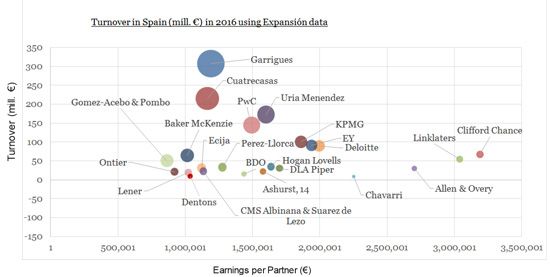 Law firms in Spain that
survived the crisis have reasons to be cheerful, but they now face
new challenges that could require a change in approach to
leadership
Law firms in Spain that
survived the crisis have reasons to be cheerful, but they now face
new challenges that could require a change in approach to
leadership
While law firms in Spain that successfully navigated the crisis
may be breathing a huge sigh of relief, they face a new set of
challenges. Research conducted by global legal consultancy Redstone
shows that firms currently have three key issues to address:
firstly, the need to ensure their `key' lawyers are happy and
motivated; secondly, the need to change their style of leadership
and possibly change their leaders; and finally, they have to make
difficult decisions about whether to focus on high-value work or
lower value commoditised work, provided it is done efficiently and
profitably.
Redstone's study analysed changes in the Spanish legal market
between 2008 and 2015 using data from Spanish newspaper
Expansión. The analysis focused on three key metrics –
income per partner, number of partners and turnover. This data was
used to plot different strategies that were adopted pre-crisis
– whether it was "growth at all cost" or
"quality work and profit first" – and then how the
strategies changed. For some firms size became a proxy for growth
strategy, while a higher income per partner reveals those firms
more concerned with the quality, and presumably profitability, of
work undertaken.
Key conclusions from the research include:
- Since 2008, it's clear the Spanish legal market has undergone unprecedented change in a relatively short period.
- Large and small firms adopted different strategies in response to the crisis, and the market will continue changing as firms adapt.
- As the crisis broke, transactions slowed , leading to an over-supply of services. Prices fell rapidly, though not for the highest value work. Firms that were well positioned at the top end, therefore, benefited from a softer landing as the economy slowed. For those providing more general services, it must have felt like a crash landing.
- Prices fell more quickly across Spain (and in Portugal) than in some other comparable jurisdictions.
Redstone chairman Peter Cornell, previously head of Clifford
Chance in Spain and the firm's former global managing partner,
says: "Our surveys of Spain's general counsel in this
period show the tables turning in their favour. Many said they had
a wider range of firms hungry for work. Under increasing cost
pressure and unable to perceive a quality difference between
providers, they were able to drive down prices." But Cornell
adds that general counsel were helped by the firms in this respect.
"As a former lawyer, I see the temptation to reduce prices to
win work," he says. Consequently, Redstone concludes, as many
of those lower-fee agreements were not agreed under a short-term,
emergency basis, it is unlikely the pricing issue – for
standard-type work – will be quickly overcome.
With revenues falling rapidly, some law firms reduced lawyer
numbers. Meanwhile, in andem, many firms also offered salary
partners a place in the equity, neatly moving what were fixed
salary costs into part of the profit share, with the additional
benefit of developing a higher sense of ownership among those
promoted. And, as part of the new selection for equity, it was no
surprise that some firms took the opportunity to filter out poorer
performers. As a result, the largest firms reduced headcount
drastically.
So who fared best, and worst, during the crisis? The Redstone study
highlights four different approaches adopted by law firms.
The Spanish elite
The biggest Spanish firms emerged stronger with Garrigues reporting
revenue of more than €349 million in 2016, an 18 per cent
increase on the 2008 total of €296 million.
Similarly, Cuatrecasas reported €269 million in revenues in
2016, up 12 per cent from €240 million in 2008. Meanwhile,
Uría Menéndez reported revenue of €222m in 2016,
an increase of 28 per cent on the 2008 figure of €174
million.All three firms can boast of being in a better position.
Credit must be given to these firms for their resilience, and their
ability to make tough decisions and adapt. The crisis demonstrated
that the largest firms aren't necessarily the slowest moving,
with the aforementioned 'Big Three' leading the way in
terms of structure and approach, which have, in turn, been adopted
by other firms.
New entrants
During the crisis, the former accountancy firms made significant
progress, with their legal arms going from strength to strength,
according to the study. PwC, EY, Deloitte and KPMG reported huge
increases in revenue. For example, turnover at KPMG stood at
€67 million in 2008 and by 2016 it had reached €103.8
million, despite challenging market conditions.
The impact of the rise of the 'Big Four' raises interesting
questions – these firms have taken an opportunity to grow at
low cost during the crisis years, making lateral hires from major
firms, without the usual high investment required in training and
development. The 'Big Four' now have the challenge of
keeping their top hires within a business environment that will
seem alien to many lawyers.
Global firms
The 'global elite' firms in Spain have fared well, likely
due to their focus on "higher value" work, with the
ability to project manage assignments, and costs, behind the scenes
and still returning a much higher "income per lawyer"
than that achieved by major Spanish firms. Clifford Chance and
Linklaters achieved "income per partner" of €2.8 and
€3.3 million in 2016 respectively, strikingly higher than that
recorded by Garrigues and Cuatrecasas, both of which achieved
between €1.1 and 1.2m. Among the locals, Uría
Menéndez has the highest income per partner, reporting
€1.6m last year.
Mid-market blues
The bottom-left of the bubble chart (see box) was the most crowded
area pre-crisis, with the "mid-market" firms sharing a
similar space. Some find themselves with difficulties, with neither
the brand for the highest value work nor the infrastructure
required to do standard work profitably. Noticeably, during this
period some firms dug themselves out of this predicament - in
particular, DLA Piper, which reported revenues of €30 million
in 2016, compared to €17 million in 2008. Meanwhile,
Pérez-Llorca is another firm experiencing strategic growth,
achieving €1.27 million "income per partner" in
2016.
What happens next?
Post crisis, many lawyers in Madrid are, unsurprisingly, enjoying a
brief "good to be alive feeling", but, according to
Redstone, they now have a new set of priorities, which are as
follows:
- Firms must look after "key" lawyers more than ever. High performers stay put during a downturn, even if unhappy, deciding to move on only once the climate improves.
- Firms that benefited from strong, decisive leadership during the crisis will now be looking for a change in approach and possibly new leaders. After the pain of change and redundancies, people want downtime to recover, Redstone says, so "peacemakers" are required.
- For the highest performing lawyers, who forgo higher incomes for the good of the firm during the bad years, remuneration systems will be "firmly on the agenda for review", says Redstone director Moray McLaren, who leads the consultancy's Iberia practice. "Firms must find a balance between keeping the junior partners within equity while appropriately rewarding top lawyers."
The good news for law firms is that, for higher value services, prices will be rising as transactions increase and lawyers get busy again. But prices for standard work will remain low. Firms need to do standard work profitably – for instance through the use of technology – or make difficult decisions about the type of work they should do going forward.

The content of this article is intended to provide a general guide to the subject matter. Specialist advice should be sought about your specific circumstances.

